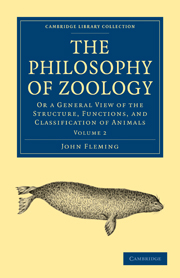 The Philosophy of Zoology
The Philosophy of Zoology PART FIRST - ON THE CONDITION OF ANIMALS
Published online by Cambridge University Press: 05 October 2010
Summary
Each species of Animal is destined, in the absence of disease and accidents, to enjoy existence during a particular period. In no species, however, is this term absolutely limited, as we find some individuals outliving others, by a considerable fraction of their whole life. In order to find the ordinary duration of life of any species, therefore, we must take the average of the lives of a number of individuals, and rest satisfied with the approximation to truth which can thus be obtained.
There is but little resemblance, in respect of longevity, between the different classes, or even species of animals. There is no peculiar structure, by which long-lived species may be distinguished from those which are short-lived. Many species, whose structure is complicated; live but for a few years, as the rabbit, while some of the testaceous mollusca, with more simple organization, have a more extended existence. If longevity is not influenced by structure, neither is it modified by the size of the species. While the horse, greatly larger than the dog, lives to twice its age, man enjoys an existence three times longer than the former.
The circumstances which regulate the term of existence in different species, exhibit so many peculiarities, corresponding to each, that it is difficult to offer any general observations on the subject. Health is precarious, and the origin of diseases generally involved in obscurity.
- Type
- Chapter
- Information
- The Philosophy of ZoologyOr a General View of the Structure, Functions, and Classification of Animals, pp. 2 - 111Publisher: Cambridge University PressPrint publication year: 2009First published in: 1822


